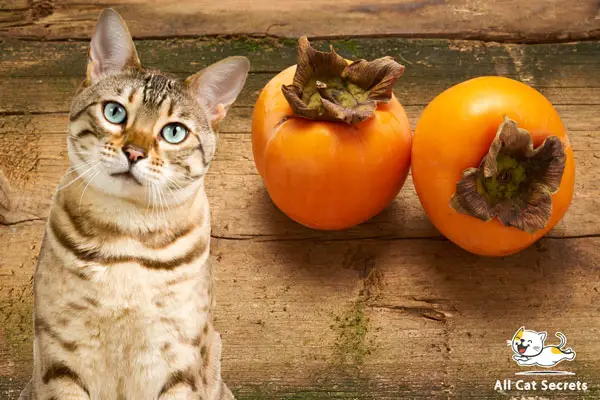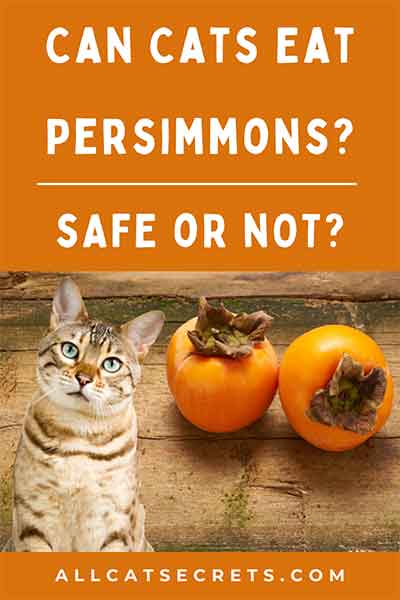Cats are highly curious animals. Their curiosity often leads them to consume potentially dangerous foods.
Cats also have a reputation for earnestly begging for human foods. Their irresistible meows, sweet purrs, and gentle head rubs are often convincing enough to have us share some people foods with them.
However, it’s the responsibility of any pet parent to examine the safety of any food products before feeding it to their feline friends. That’s especially true for plant-based foods like fruits and veggies.
The fact that persimmon is essentially a plant-derived product is reason enough to think twice before feeding it to your kitto. But as you shall find, not all plants are toxic to pets. In fact, your cat can safely snack on numerous plant materials, either raw or cooked. So, where does that leave persimmons, can cats eat persimmons?
The answer is a resounding yes. Persimmons are classified alongside lychees, peaches, plums, etc, as fruits that cats can safely eat. The fruit is nutritious too, boasting a number of minerals, vitamins, and antioxidants.
Perhaps you’re a proud cat owner who also loves to snack on persimmons and are always wondering, ‘are persimmons ok for cats?’ Well, it would interest you to know that you can comfortably share this nutritious fruit with your feline companion.
However, as with all plant-based foods, cats can only consume persimmons occasionally and in moderate amounts. Too much of the fruit could trigger severe adverse effects, including intestinal obstruction.
Read on for an insightful overview of cats and persimmons.
Table of Contents
More About Persimmons
If you’re a proud cat owner who also loves persimmons, it will only be a matter of time before your feline friend comes meowing for a share of this fruit. During these moments of earnest begging, it’s natural to find yourself wondering, ‘are persimmons safe for cats?’
As we’ve just indicated, persimmons are generally safe and even nutritious for cats if consumed in moderate amounts. But before we explore the reasons to consider giving your cat some persimmon, it would be best to start by understanding what this fruit is.
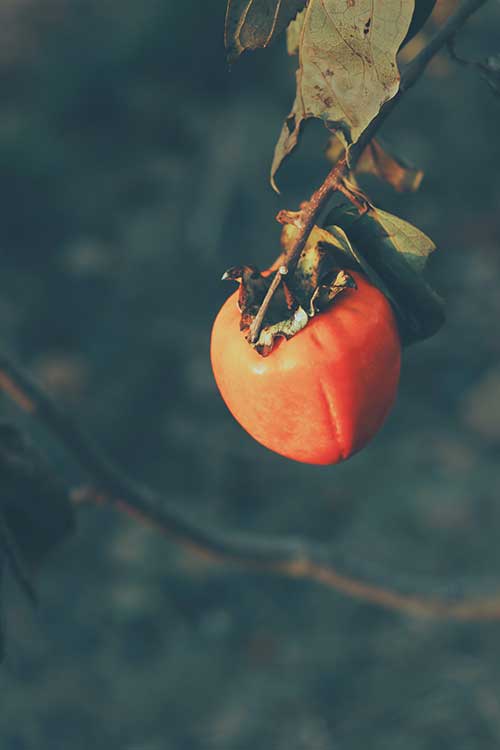
Now, persimmon is a sweet, orange-colored, edible fruit that grows in several tree species in the genus Diospyros. The most widely cultivated persimmon variety is the Oriental persimmon which goes by the taxonomic name Diospyros kaki.
Persimmons are originally from China. The country still boasts the highest persimmon production in the world. In 2019, China accounted for over 75% of the world’s total persimmon production.
However, due to its high nutritional profile, persimmons are consumed in numerous countries worldwide. That also means the fruit is accessible by millions of cats around the world.
But the question remains, can cats have persimmons?
Although we’ve already scratched the surface of this question, the following sections shall expound further on it.
- Food supplement for everyday use. Supports cell protection and strengthens your cat’s adaptive immune system with important...
- Organically bound trace elements zinc, manganese and selenium. DL-methionine for a well-balanced metabolism, taurine for vitality...
- Supports cats of every age, older cats and kitten. Long-term or short-term treatment for skin and fur troubles like hair loss,...
Last update on 2025-02-11 / Affiliate links / Images from Amazon Product Advertising API
Health Benefits of Persimmons for Cats
A 100-gram (3.5-ounce) serving of fresh Diospyros kaki boasts the following nutritional profile;
- Energy – 293 kilojoules (70 kilocalories)
- Proteins – 0.58 grams
- Total Carbohydrates – 18.59 grams
- Sugars – 12. 53 grams
- Fiber – 3.6 grams
- Fats – 0.19 grams
- Water – 80 grams
- Vitamin A Equivalent – 10% of the recommended daily intake (RDI)
- Vitamin B1 (Thiamine) – 3% of the RDI
- Vitamin B2 (Riboflavin) – 2% of the RDI
- Vitamin B3 (Niacin) – 1% of the RDI
- Vitamin B6 (Pyridoxine) – 8% of the RDI
- Vitamin B9 (Folate) – 2% of the RDI
- Choline – 2% of the RDI
- Vitamin C – 9% of the RDI
- Vitamin E – 5% of the RDI
- Vitamin K – 2% of the RDI
- Calcium – 1% of the RDI
- Iron – 1% of the RDI
- Zinc – 1% of the RDI
- Phosphorus – 2% of the RDI
- Magnesium – 3% of the RDI
- Potassium – 3% of the RDI
- Manganese – 17% of the RDI
It’s worth noting that there are several persimmon varieties. Some could have an even higher nutritional profile than the popular Diospyros kaki.
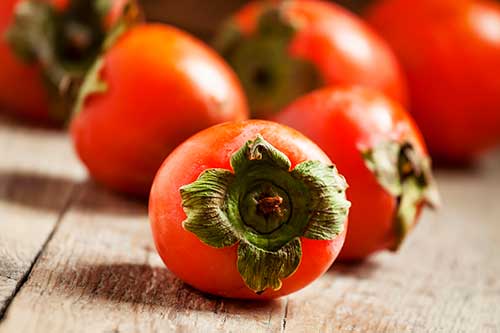
The following are some of the essential nutrients in persimmons and how each nutrient could benefit your cat;
1. Dietary Fiber
Fiber is probably best known for its weight loss benefits. That’s due to its ability to induce a feeling of fullness sooner and for longer.
So, if you’re worried that your cat is packing up too much weight, you might consider supplementing his diet with fiber-rich fruits like persimmons.
Fiber also improves digestion. When consumed, dietary fiber splits into soluble and insoluble fiber.
Soluble fiber provides the nutrients required by the gut-friendly bacteria that live throughout your cat’s alimentary canal. This boosts food metabolism while also guarding against metabolic disorders. Insoluble fiber adds bulk to a cat’s stool, which is useful in relieving constipation.
2. Water
Water shares one fundamental quality with dietary fiber – the ability to trigger a sense of fullness sooner and for longer.
Therefore, the high water content in persimmons might work synergistically with fiber to aid weight loss.
Water is also excellent for rehydration. Plus, it plays a role in all physiological functions in an animal’s body.
3. Antioxidants
Like most fruits, persimmons are high in antioxidants. Antioxidants are compounds that prevent or decelerate cell damage occasioned by oxidative stress.
Oxidative stress is a phenomenon caused by the overaccumulation of unstable molecules known as free radicals in body cells. The phenomenon is linked to premature aging and chronic diseases like heart disease, diabetes, and cancer.
Fortunately, persimmons contain powerful antioxidants that could neutralize the adverse effects of free radicals in body cells. Common antioxidants in persimmons include flavonoids and carotenoids.
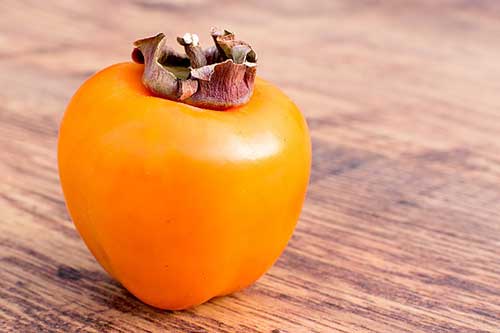
4. Vitamin A
Vitamin A is the most abundant vitamin in persimmons. The vitamin supports vision by enhancing the functioning of the cornea as well as conjunctival membranes.
Vitamin A works in conjunction with lutein and zeaxanthin to promote your cat’s vision. Incorporating vitamin A-rich persimmons into your cat’s diet might help to protect against numerous vision problems, such as age-related macular degeneration.
5. Calories and Fats
Persimmons are incredibly low in calories and fats. That makes them an excellent weight loss-friendly fruit.
Is Persimmon Good For Cats?
We’ve just reviewed some of the numerous potential health benefits of persimmons for cats. But does that mean you can comfortably share persimmons with your feline friend? Is it safe for cats to eat persimmons?
Not only are persimmons safe for cats. These fruits are nutritious too.
But before you actually go ahead and give your cat any persimmon, you’d do well to also understand any side effects to watch out for. Remember that persimmon is inherently a plant-based food, and your kitto is an obligate carnivore. So, will always be genuine side effects to watch out for.
- Natural prebiotic fiber, sourced from chicory root, helps promote digestive health
- High protein formula with real chicken as the first ingredient
- Fortified with live probiotics to support digestive and immune health
Last update on 2025-02-11 / Affiliate links / Images from Amazon Product Advertising API
Possible Issues With Persimmons for Cats
Stomach upset is the most widely-reported adverse effect of persimmons for cats. The gastrointestinal side effects of persimmons primarily stem from the fact that cats are obligate carnivores. As such, their stomachs are wired to digest animal protein; not plant-based diets like persimmons. Common symptoms to expect include vomiting and diarrhea.
What complicates the situation is that persimmons are loaded with tannins, chemicals known to cause toxicity in animals and humans. When consumed in large amounts, tannins bind with proteins in the stomach in an intricate mechanism that could trigger digestive issues like constipation and diarrhea.
So, are persimmons poisonous to cats?
Based on the above revelation of the potential risks of tannins, it’s natural to ask – are persimmons toxic to cats?
Unfortunately, persimmons can be toxic to cats if fed in excess. That’s mainly due to the presence of tannins in these fruits and the fact that cats don’t require too much fruits in their diets.
Are persimmons bad for cats then?
The fact that persimmons contain the potentially toxic chemical tannin doesn’t immediately make these fruits bad for cats. As you shall find, the toxicity of persimmon for cats largely depends on the quantity consumed. Besides, there are plenty of health benefits that make this fruit good for cats to eat.
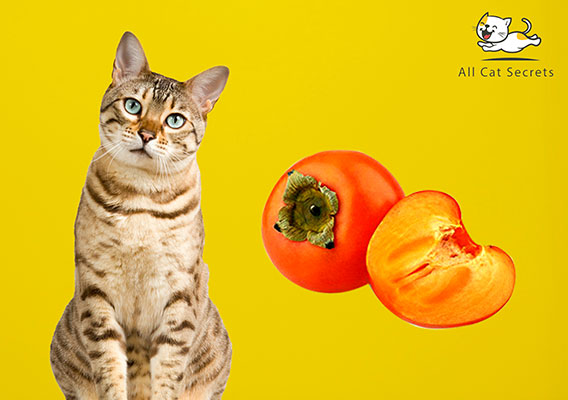
Allergy is another common problem with persimmons for cats. Note that cats are allergic to many fruits and persimmon is one of them.
Perhaps you’ve always wondered, are cats allergic to persimmons?
Yes, cats can indeed develop allergic reactions to persimmons. Symptoms could range from digestive issues like vomiting and diarrhea to signs of respiratory distress, skin itchiness, and even anxiety.
So, can persimmons make cats sick and if so, will persimmons hurt cats?
Not only can persimmons make your cat sick. The fruit could also hurt your feline friend if fed with careless abandon.
The saving grace, however, is that it will take a considerable amount of persimmons to induce any worrying side effects in cats.
Also, allergic reactions will depend on individual cats. There are good chances that your feline friend may not develop any persimmon allergy at all.
Can Cats Eat All Persimmon Parts?
Like many fruits, persimmons have skin and flesh as well as seeds and a pit. But not all these parts are edible, be it for humans or cats.
Can Cats Eat Persimmon Skin?
Cats shouldn’t eat persimmon skin. Besides its unsavory taste, persimmon skin is also loaded with tannins, the chemical known to cause toxicity. Plus, the skin might prove too tough for your cat to chew.
Can Cats Eat Persimmon Leaves?
Persimmon leaves, much like the skin, are bitter and hard for cats to chew. So, you should never allow your kitto to nibble on persimmon leaves.
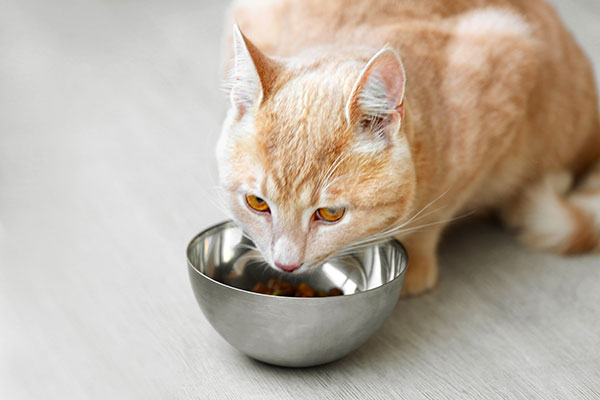
Can Cats Eat Persimmon Pit?
Absolutely not. Persimmon pit is a major choking hazard and might cause intestinal obstruction. The same goes for persimmon seeds.
Can Cats Eat Persimmon Meat?
Persimmon meat is basically persimmon flesh. It’s the only part of the fruit that cats should eat.
Can Cats Eat Fuyu Persimmons?
Fuyu persimmon is just one of the many persimmon varieties and it’s perfectly safe for cats.
There’s also the dilemma of choosing between ripe and unripe persimmons. But which of these two options is recommended?
Can cats eat unripe persimmons?
No, cats should never eat unripe persimmons. That’s for the simple reason that unripe persimmons are bitter and harder for cats to digest.
Can cats eat fresh persimmons then?
Yes, cats should only consume ripe and fresh persimmons. However, avoid overly ripe persimmons as these could produce a laxative effect.
- SmartBlend of high-quality ingredients in the digestive care cat food starts with real salmon along with accents of carrots and...
- High levels of protein in Purina ONE Tender Selects Blend adult dry cat food with salmon help support your cat's strong muscles,...
- Is Purina ONE good for cats? This natural dry cat food with added vitamins, minerals and nutrients and no artificial flavors or...
Last update on 2025-02-11 / Affiliate links / Images from Amazon Product Advertising API
Preparing Persimmons for Cats
Cats can eat persimmons raw or cooked. That helps settle the question ‘can cats have cooked persimmons?’
But whichever preparation method you opt for, remember to start by picking fresh persimmons. Next, peel off the skin and wash the fruit in clean water. You can then slice the persimmon into bite-size portions and feed it to your cat raw or boil the portions over moderate heat before offering them to your kitto. If you choose to give your cat cooked persimmons, avoid cooking the fruit using fat, salt, or spices.
Can cats eat dried persimmons?
Cats can eat dried persimmons. But they probably shouldn’t. That’s due to the risks of dehydration. Besides, dried foods tend to contain brine and other compounds that cats shouldn’t eat.
Conclusion: Can My Cat Eat Persimmon?
Yes, persimmons are safe and nutritious for cats if fed in moderation. Avoid giving your cat more persimmons than his stomach can handle.
It’s also important to know what to do if your cat eats a persimmon behind your back. While small amounts of the fruit won’t be problematic, high quantities might necessitate a trip to the vet.
Checkout Our Favorite Cat Products
1. Best Online Course For Cat Parents
Our favorite: The Cat Language Bible (How to Finally Understand And Speak to Your Cat) – A new form of cat to human communication that many cat owners have dreamed about… but few have actually thought possible.
2. Best Immune Support For Cats
Our favorite: Tomlyn Immune Support – Best Supplement for Cats and Kittens.
3. Best Cat Treats
Our favorites: LIFE ESSENTIALS All Natural Freeze Dried Chicken And Sheba Meaty Tender Sticks – Both are Great.

